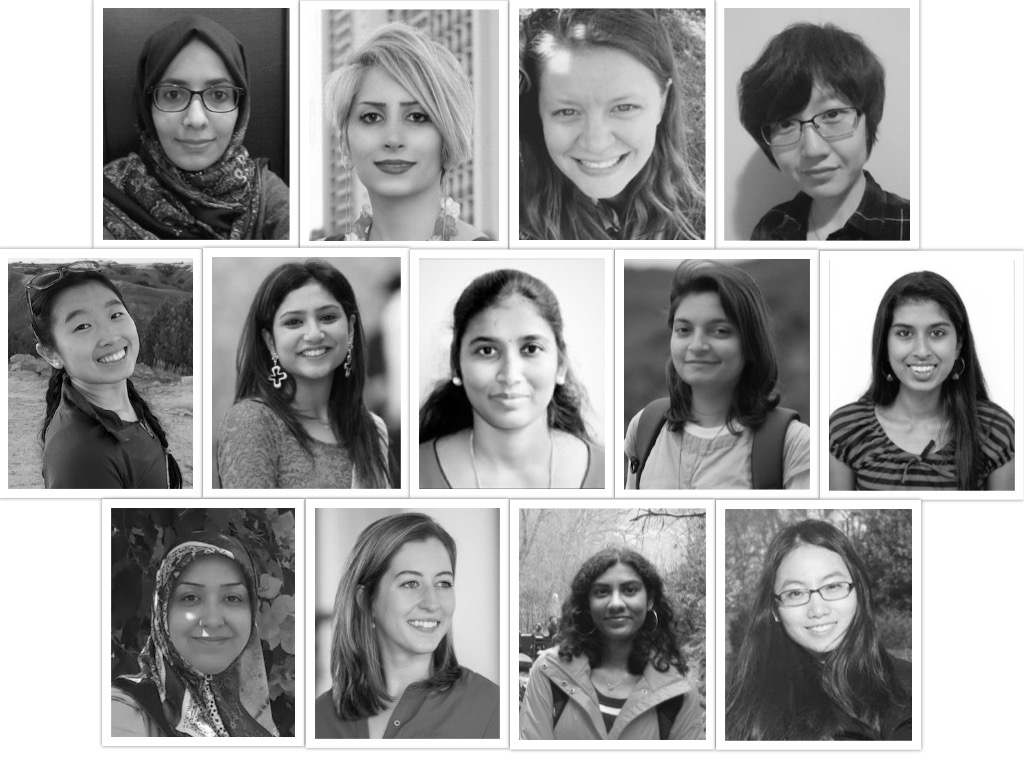


 |
Ghadeer Almusaddar, Kyushu University Ghadeer Almusaddar is a second year masters student at Kyushu University in Japan. Her research interests are in computer architecture support for security, covert and side channel attacks and adversarial machine learning. |
 |
Poona Bahrebar, Ghent University Poona Bahrebar received the B.Eng. degree in Software Engineering, and M.Eng. degree in Hardware Engineering with the highest GPA (summa cum laude) from the National University of Iran in 2005 and 2007, respectively. She received the Ph.D. degree in Computer Science Engineering from Ghent University, Belgium, in 2017 where she is currently a Post-Doctoral Researcher at the Department of Electronics and Information Systems. Her research interests include on-chip interconnection networks, run-time reconfiguration, fault tolerance, and computer architecture. |
 |
Kristin Barber, Ohio State Kristin is a Ph.D. student in the Computer Science and Engineering department at Ohio State University working with Dr. Radu Teodorescu in the area of hardware security. Kristin received her master's from the Electrical and Computer Engineering department at the University of Cincinnati in 2013 and has interned with Nvidia and Intel Labs. Her interests include hardware security, energy-efficient computing and domain-specific accelerators. |
 |
Cheng Li, UIUC Cheng Li is a PhD candidate in Computer Science at the University of Illinois at Urbana-Champaign and a member of the IMPACT Research Group led by Professor Wen-Mei Hwu. Her research interests are System Design and Engineering for Machine Learning and GPU Acceleration for AI and HPC Applications. |
 |
Katie Lim, University of Washington Katie Lim is a first year PhD student at the School of Computer Science & Engineering at University of Washington advised by Prof. Michael Taylor and Prof. Tom Anderson. Her research interests are in computer architecture and operating systems with a focus on heterogeneous architectures. She is a recipient of the NSF GRFP, the Marilyn Fries Endowed Regental Fellowship, and an ARCS Fellowship. She previously attended Princeton University and graduated summa cum laude in 2018 as the Latin salutatorian, receiving a BSE in Computer Science. She was advised by Prof. David Wentzlaff for her senior thesis which focused on developing a heterogeneous-ISA research infrastructure by integrating a RISC-V core into the OpenPiton framework. Katie enjoys contributing to open-source hardware projects and has contributed to OpenPiton and lowRISC. At Princeton, she helped extend the OpenPiton framework in various ways, including rebuilding the I/O system from scratch to streamline the process of integrating new I/O devices. She also prototyped an FPGA system integrating OpenPiton with the MIAOW open-source GPU. She spent the summer following her junior year at the University of Cambridge working with Dr. Robert Mullins, a co-founder of the Raspberry Pi project, on a new open-source processor called lowRISC. She helped to develop support in the Linux kernel for lowRISC tagged memory. |
 |
Divya Mahajan, Georgia Institute of Technology Divya Mahajan is a PhD candidate in the Computer Science Department at Georgia Institute of Technology where she is advised by Professor Hadi Esmaeilzadeh. She received her Bachelors (2012) in Electrical Engineering from Indian Institute of Technology Ropar, India where she was honored with the President of India Gold medal for her outstanding academic performance. Subsequently, she completed her Masters (2014) from the University of Texas, at Austin in Electrical and Computer Engineering. She joined her PhD studies in Fall 2014 and since has been a part of Alternate Computing Technologies lab which is directed by Hadi Esmaeilzadeh. Her research interests include computer architecture, microarchitecture design, and developing alternative technologies for efficient computing. She is continuously working towards designing full stack solutions and template-based architectures for accelerating Machine Learning and Deep Learning algorithms on an FPGA. Besides her primary research-area of computer architecture, she has also worked at the intersection of machine learning, hardware design, programming languages and databases. In her free time, she likes to spend time oil painting, cooking, and reading novels. |
 |
Vijayalakshmi Saravanan, Ryerson University Vijayalakshmi Saravanan received her Ph.D. in Computer Science and Engineering from VIT University, India under Erasmus Mundus Fellowship (EURECA) as research exchange student at Malardalen University, Sweden and visiting researcher at Ryerson University, Canada. She is currently an Assistant Professor in Practice at University of Texas, San Antonio (UTSA) in the department of Computer Science. Prior to this, she was a Postdoctoral Associate at UB (University at Buffalo), The State University of New York, USA and University of Waterloo, Canada under the prestigious "Schlumberger Faculty for the Future" Fellowship award (2015-2017). She is having 10 years of teaching experience in two premier Universities VIT and Amrita Vishwa Vidyapeetham, India. Dr. Saravanan has published many technical articles in scholarly international journal and conferences. She is serving as technical reviewer and program committee member for reputed conference & journals such as GHC, SIGCSE and Springer. Her research interests include Power-Aware Processor Design, Big Data, IoT and Computer Architecture. She is a Senior Member of IEEE & ACM, CSI, Ex-Chair for IEEE-WIE VIT affinity group, India (2009-2015), NPA (National Postdoctoral Association) Annual Meetings committee, Workshop/IIA Co-Chair (2017-2018)/Poster committee Co-chair (2018-2019) and a Board member of N2WOMEN (Networking Networking Women). |
 |
Amna Shahab, University of Edinburgh Amna Shahab is a 3rd year PhD student at University of Edinburgh. |
 |
Akshitha Sriraman, University of Michigan Akshitha is a fourth year Ph.D. candidate at the University of Michigan, where she is advised by Dr. Thomas F. Wenisch. Her research primarily focuses on developing software and hardware optimizations to improve the performance of large-scale distributed data center systems. |
 |
Soamyyeh Taheri, Waseda University Somayyeh Taheri is a PHD student at the Energy Aware Systems Laboratory (EASY Lab) in the Department of Computer Engineering, Sharif University of Technology, Iran. Currently, she is working as a Exchange Student at the Information, Production and system (IPS) graduate school, Waseda University, Japan. She is completing her Ph.D. with a thesis on Comprehensive Energy Management in Geo-Distributed Data Centers with Renewable Energy and Smart Grid. Her area of interest includes Cloud Computing, Geo-Distributed Data Center, and Energy Management. Somayyeh Taheri's researches are actively involved in studying the effective usage of Renewable Energy as well as Free Cooling in Data Center, Green Geographically Load Balancing (Green GLB), and Cost and Energy- Effective Big Data Processing. |
 |
Caroline Trippel, Princeton University Caroline Trippel is a PhD candidate in the Computer Science department at Princeton University. She is advised by Professor Margaret Martonosi on her computer architecture dissertation research, specifically on the topic of concurrency and security verification in heterogeneous parallel systems. Her work has resulted in formal, automated tools and techniques for specifying and verifying the correct and secure execution of software running on such systems. She has influenced the design of the RISC-V ISA memory consistency model (MCM) both via full-stack MCM analysis of its draft specification and her subsequent participation in the RISC-V Memory Model Task Group. Additionally, she has developed a novel methodology and tool that synthesized two new variants of the recently publicized Meltdown and Spectre attacks. Caroline received her BS in Computer Engineering from Purdue University in 2013, her MA in Computer Science from Princeton University in 2015, and was a 2017-2018 NVIDIA Graduate Fellow. |
 |
Nandita Vijaykumar, Carnegie Mellon University Nandita Vijaykumar is a Ph.D. candidate at Carnegie Mellon University, advised by Prof. Onur Mutlu and Prof. Phil Gibbons. She is also currently a visiting student at ETH Zurich. Her research focuses on the interaction between programming models, system software, and hardware architecture, and explores how richer cross-layer abstractions can enhance performance, programmability, and portability. She is excited about rethinking the roles played by different levels of the stack in the modern era of rapidly evolving, specialized, and data-centric computing landscapes. She is the recipient of the Benjamin Garver Lamme/Westinghouse Fellowship at CMU. During her Ph.D., she has been fortunate to intern at Microsoft Research, Nvidia Research, and Intel Labs. |
 |
Mengjia Yan, UIUC Mengjia Yan is a PhD student at the University of Illinois at Urbana-Champaign (UIUC), advised by Professor Josep Torrellas. Her research interest lies in the areas of computer architecture and hardware security, with a focus on cache-based side channel attacks and defenses. She is a UIUC College of Engineering Mavis Future Faculty Fellow in 2018, and has received the UIUC Computer Science W.J. Poppelbaum Memorial Award for academic performance and design creativity. She interned at NVIDIA Research during the summer of 2018. |